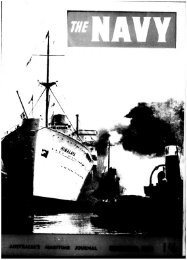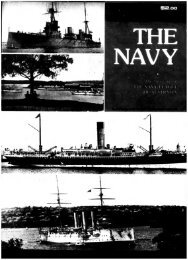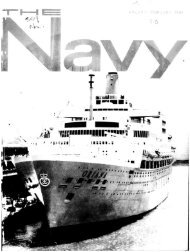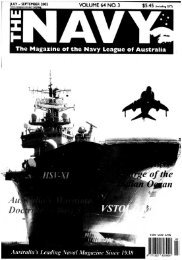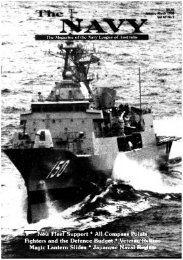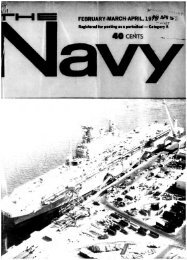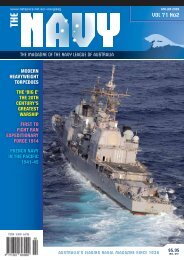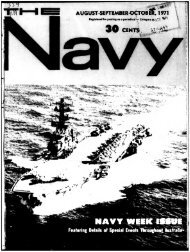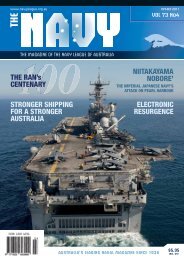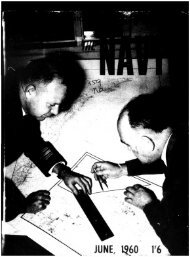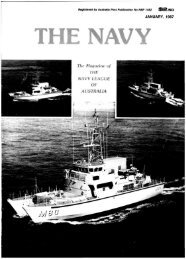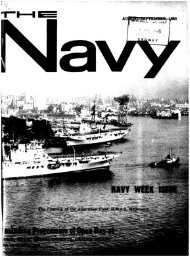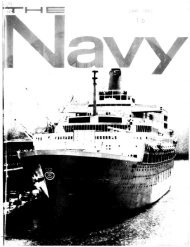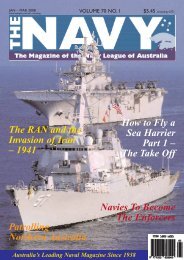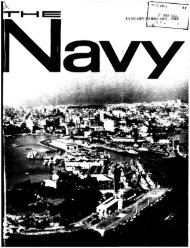Feb-Mar-Apr, May-June-July 1972 - Navy League of Australia
Feb-Mar-Apr, May-June-July 1972 - Navy League of Australia
Feb-Mar-Apr, May-June-July 1972 - Navy League of Australia
You also want an ePaper? Increase the reach of your titles
YUMPU automatically turns print PDFs into web optimized ePapers that Google loves.
Tha i n m to efficiency Ilea in QUALITY CONTROL<br />
DISTRIBUTED BY<br />
LOVELOCKS<br />
suppliers to Royal <strong>Australia</strong>n <strong>Navy</strong><br />
<strong>of</strong> QUALITY CONTROL equipment for<br />
Refrigeration, Airconditioning and<br />
Industrial applications, Du Pont<br />
FREON refrigerants and solvents<br />
F. C. LOVELOCK PTY. LIMITED<br />
Head Office and Sydnay Branch:<br />
19-21 BUCKLAND STREET, BROADWAY — Phona: 211-2811<br />
NEWCASTLE CANBERRA PERTH<br />
766 HUNTER ST JWILUNAST I.G. PRITCHARDP/L<br />
NEWCASTLE WEST FYSHWICK HK HAVELOCK ST.<br />
Phone:61-57115 Phone: 95-K22 Phone: 21-6546<br />
ADELAIDE BRISBANE MELBOURNE<br />
162-164 GOUGER ST. 67-73 MARY ST 602 LITTLECOLLINSST.<br />
Phone:51-2154 Phone: 2-3481 Phone 61-2545<br />
MERCATOR SALES<br />
COMPANY<br />
A Division <strong>of</strong><br />
The Schlegel Manufacturing Co. (Aust.) Pty. Ltd.<br />
565-569 HARRIS STREET, ULTIMO, N.S.W.<br />
Phona 211-2855<br />
Suppliers to the Department <strong>of</strong> the <strong>Navy</strong> <strong>of</strong>:—<br />
NEW! GOLD FORMULA AQUAMATIC UNIVERSAL<br />
The most advanced Synthetic cutting fluid known.<br />
A report received from the Dept. <strong>Navy</strong> shows outstanding results in all<br />
machining applications.<br />
Aquamatic has solved the problem <strong>of</strong> Dermaiitis on the hands <strong>of</strong> Operators.<br />
Pace Fifty THE NAVY <strong>Feb</strong>ruary/<strong>Mar</strong>ch/<strong>Apr</strong>il,<br />
AUSTRALIA S<br />
DEF tNCE OUTLOOk<br />
The propaganda <strong>of</strong> the East and<br />
the leftist idealism <strong>of</strong> the West have<br />
<strong>of</strong>ten made common cause in recent<br />
times by proposing pacifism as a<br />
policy for the West while choosing to<br />
disregard the monumental<br />
militarism <strong>of</strong> the East. For all the talk<br />
<strong>of</strong> peace there has never been a time<br />
when the world has faced such a<br />
frightening and massive agglomeration<br />
<strong>of</strong> armed might as is accruing in<br />
the Soviet Union today. So much for<br />
the common man's dreams <strong>of</strong><br />
peace. The Communists <strong>of</strong>fer us the<br />
peace <strong>of</strong> a prison.<br />
The same contrast applies in terms<br />
<strong>of</strong> the armed forces themselves. In<br />
the Communist countries there is no<br />
apology for the basic recruiting<br />
"incentive' which is that <strong>of</strong> a<br />
requirement by the State — again<br />
with the ultimate sanction <strong>of</strong><br />
forceable induction into the services.<br />
In <strong>Australia</strong> however, we have tried<br />
primarily the method <strong>of</strong> increasing<br />
incentives <strong>of</strong> a different kind. Wages<br />
and conditions for our servicemen<br />
have been bettered immeasureably.<br />
and compare very favourably with<br />
community norms. Our National<br />
Service reauirement is the minimum<br />
which has been necessary to sustain<br />
what is after all a very small fighting<br />
force in face <strong>of</strong> the counterattractions<br />
<strong>of</strong> civilian life.<br />
WHERE AUSTRALIA STANDS:<br />
Turning now to Austral.a's unique<br />
position, let me reiterate that the<br />
major questions facing us in<br />
defending <strong>Australia</strong> are primarily<br />
political. Looking at the world scene<br />
it is obvious that the super-power<br />
with whom we stand most closely<br />
and with whom we hold most in<br />
common is the U.S.A. In the same<br />
way. among the second line powers.<br />
Europe (including the U.K.) is clearly<br />
our closest associate, and we have<br />
high hopes that Japan and India will<br />
continue along the democratic path.<br />
Much <strong>of</strong> our diplomatic initiative <strong>of</strong><br />
the future should be directed<br />
towards greater and closer ties with<br />
these two countries, and <strong>of</strong> course<br />
with our next-door neighbour.<br />
Indonesia.<br />
We can and should project our<br />
politico-diplomatic defence<br />
strategies into the region most vital<br />
to our own interests. The future <strong>of</strong><br />
Singapore and Malaysia are<br />
obviously important, and the ANZUK<br />
arrangements are a demonstration<br />
<strong>of</strong> our concern and desire for a voice<br />
in any new power movements in the<br />
area.<br />
Overarching all else however is the<br />
great politico-defence value <strong>of</strong> the<br />
ANZUS Treaty which both we and<br />
more importantly the U.S.A.<br />
consider vital to defence planning.<br />
This represents solid achievement in<br />
terms <strong>of</strong> ultimate defence. No realist<br />
would argue that an automatic<br />
response should be demanded<br />
whereby we would obtain instant<br />
support from the U.S.A. without<br />
prior decision by their political<br />
authority. Nevertheless, every new<br />
assertion <strong>of</strong> the prime importance <strong>of</strong><br />
ANZUS. such as achieved by Mr<br />
McMahon when in Washington<br />
recently, is <strong>of</strong> immense value, and is<br />
about as far as any realist could<br />
expect our ally to go.<br />
Nevertheless, having said all this, it<br />
is still necessary for us to ask<br />
ourselves in brutal frankness such<br />
questions as: How sure are we <strong>of</strong><br />
the possibilities <strong>of</strong> our closest<br />
friends maintaining their present<br />
political determination?' — or 'To<br />
what degree will the future<br />
governments <strong>of</strong> allied nations be<br />
able to count on the support <strong>of</strong> their<br />
own peoples in situations which<br />
could be vital to our security but<br />
which might involve them in the<br />
sacrifices <strong>of</strong> war?' These questions<br />
are the political crunch for all treatymakers.<br />
In addition to political considerations<br />
there are. <strong>of</strong> course, economic<br />
and industrial areas where once<br />
again it is necessary for us to<br />
question whetner the West as a<br />
whole can match the resources <strong>of</strong><br />
the East. Our friends and ourselves<br />
are vulnerable to tactics <strong>of</strong> division,<br />
industrial sabotage and the<br />
destruction <strong>of</strong> confidence which can<br />
readily reduce our economic<br />
strength. In terms <strong>of</strong> military<br />
manpower and hardware the<br />
ultimate question emerges whether<br />
the West will be able to retain at least<br />
an equally or sufficiently formidable<br />
capacity to deter aggression.<br />
It is vitally necessary for us in<br />
<strong>Australia</strong> to learn the politicomilitary<br />
lessons <strong>of</strong> Indo-China and<br />
Taiwan as well as those <strong>of</strong> Central<br />
Europe. We have seen the sentiment,<br />
loyalty or morality factors in international<br />
politics sink to bottom place<br />
among necessary considerations.<br />
Indo-China and Taiwan are cases in<br />
point. The world generally is apparently<br />
prepared to sacrifice the freedom<br />
<strong>of</strong> these countries, and with it<br />
the lives <strong>of</strong> millions who have trusted<br />
their word for motives varying from<br />
sheer indifference to a transient political<br />
expediency In the light <strong>of</strong> the<br />
cold realities <strong>of</strong> super-power politics,<br />
a small power such as ourselves must<br />
surely be excused for cynicism in<br />
this field. It should be admitted that<br />
protests against any form <strong>of</strong> military<br />
action are much more effective in<br />
the West than in the East, to say the<br />
least. By the same token too. the<br />
resources <strong>of</strong> the West — whether<br />
political, economic, military, or in<br />
the mass media — these areas are<br />
much more open to attack from<br />
within than they are in the<br />
Communist world.<br />
<strong>Australia</strong>'* 4.900-ton guldad missile destroyer <strong>of</strong> tha Charles F Adams class. H.M.A.S. Perth



